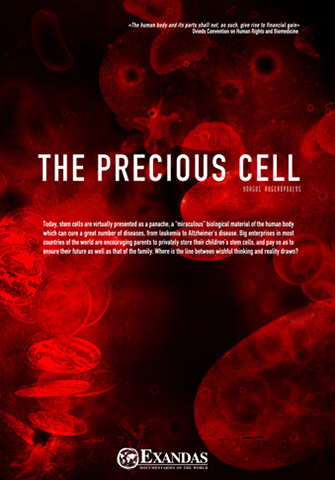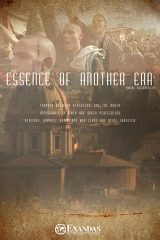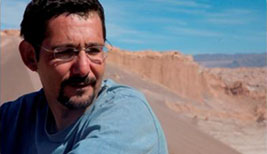
The Precious Cell
Dir: Yorgos AvgeropoulosToday, stem cells are virtually presented as a panache, a “miraculous” biological material of the human body which can cure a great number of diseases, from leukemia to Alzheimer’s disease. Big enterprises in most countries of the world are encouraging parents to privately store their children’s stem cells, and pay so as to ensure their future as well as that of the family. Where is the line between wishful thinking and reality drawn?
Watch the Film Now!
Choose the language you prefer and stream the film in Full HD from any digital device. Enjoy your private screening!
Buy the DVD
Public Screening
Are you interested in organizing a public screening of our film? Send us an email with your inquiry and we will be glad to assist you!
Educational / Library Use
Are you interested in enriching the library of your institution with our film? Contact us and let's create together an informed public!
- DURATION: 56min
- AVAILABLE IN THE FOLLOWING LANGUAGES: English | Greek
- AVAILABLE VERSIONS: English (56min) | Greek (56min)
- YEAR OF PRODUCTION: 2010
- Written & Directed by: Yorgos Avgeropoulos
- Produced by: Georgia Anagnou
- Research: Georgia Anagnou, Thomais Papaioannou
- Director of Photoghaphy: Yiannis Avgeropoulos, Alexis Barzos
- Research Coordinator: Aggelos Athanasopoulos
- Production Manager: Anastasia Skoubri
- Editing: Yiannis Biliris, Anna Prokou
- Original Music: Yiannis Paxevanis
- Graphics: Sakis Palpanas
PRODUCTION NOTES
In our days, the commercialization of human cells is a profitable global enterprise. Various companies, at times transnational enterprises, undertake the processing and conservation, at -196 °C, of your child’s stem cells, claiming they could prove useful for the cure of possible serious blood, cardiovascular, metabolic and even neurological illnesses occurring in the future.
Greece is home to the biggest number of private stem cell banks per capita in the world and the biggest in absolute numbers in Europe. “Approximately 15 to 20”, says Mr. Antonis Dimopoulos of the Ministry of Health, who admits to not knowing their exact number, as “this moment they are practically operating without a specific regulatory and legal framework”.
“The benefits of private storage are of a practical, but also a scientific type”, says Mr. Yorgos Karavanas, spokesman for the Greek Association of Umbilical Cord Blood Banks. “The practical part is that, since you have privately stored a sample, that sample belongs to you. Its availability is guaranteed. The scientific advantage is that, in cases demanding an autologous transplant, you are covered 100%. Since the sample comes from your body, it is 100% tissue-compatible”.
Mr. Vasilis Kelaris, Commercial and Medical Manager for a private bank, member of the Association of Accredited Banks, adds: “Because stem cells are stored for the whole family and not only for the child, it has been proven that they can also be used by the parents or any brother or sister, with a higher probability of tissue compatibility”.
“Therefore, families who have saved their child’s umbilical cord blood have comparatively higher chances of being cured, if they are amongst the few unlucky who require such a transplant”, Mr. Karavanas concludes.
It is true that the blood remaining in the central vain of the umbilical cord once the child is born contains a high percentage of primitive hematopoietic cells. These cells, which we would usually collect from bone marrow, can be found today in abundance in the baby’s umbilical cord, and collected in a way that presents no danger for the infant or the mother.
Only at birth does nature give out so openhandedly something that is so precious. The primitive hematopoietic cells of the umbilical cord blood, which were until recently discarded, are now saving lives. They are being successfully transplanted into patients with leukemia and other serious blood diseases as an alternative source to bone marrow. And, more importantly, scientists now have a much greater possibility of finding an adequate transplant for each patient, as cord blood demands a much lesser compatibility rate than bone marrow. About 30,000 lives have been saved up to today, 60 of them in Greece.
However, the vast majority of those cured were not healed with their own “blood”—which, in some cases, they had saved—but with the cord blood of another, usually unknown, donor. A baby, whose cord blood was donated by its mother to the global bank for public use.
Anthony Dones would not grow up. He was 40 months old and still small for his age. The doctors diagnosed a rare disease called osteopetrosis; his only chance to live was a bone marrow transplant. His mother, Tracey, had stored her son’s cord blood in a Private Bank. “When I was pregnant, I saw all the pregnancy magazines telling parents to store their baby’s cord blood, in case it gets sick, etc… So we paid to store the cord blood, and I felt that if my child ever got sick, at least we’d kept its cord blood which would be able to save his life”.
Tracey was relieved to find out that osteopetrosis could be cured with stem cells, as the company’s catalogue wrote. She mentioned it to the doctors. “They told me it was useless, that it couldn’t be used. Precisely because it came from him, it had the same genetic problems that caused his condition. And for that reason they could not be used”, Tracey Dones says. “I felt crushed, deceived. I am still furious about that, even today”. As time was running out, a compatible donor was sought through the World Donor Bank, with which Public Banks are connected throughout the world and anyone can access. In a week’s time, a transplant was found in the New York Public Bank, Anthony underwent surgery and is today cured. “I think the private cord blood storage industry”, says Mrs. Dones, “has put so much effort into publicity, that parents almost feel they are doing something wrong if they do not pay for storage. I believe it is necessary for more and more people to know that, if they can donate it, they should, because the possibility of saving someone else’s life is something they’re not even aware of”.
Scientific data are increasingly suggesting that the possibilities of a child needing a transplant of its own hematopoietic cells, therefore making use of privately stored cord blood, are very few. “The possibilities are scant, 0.003 per mill, that means 1 in every 300,000”, says Dr. Elianne Gluckman, leading hematologist and “mother” of the umbilical cord blood transplant. She performed the first successful transplant in Paris in 1988, to a little boy suffering from Fanconi anemia who received his brother’s compatible cord blood.
However, private bank representatives stress that the possibilities are much higher, 1 in a 100! They also emphasize the fact that the sample does not only concern the child itself, but also its parents or brothers and sisters, while arguing that recent progress in research indicates that primitive hematopoietic cells have plasticity, meaning they could produce not only blood, but also cells for other systems.
“1 in a 100?” Mrs. Gluckman wonders. “That is a very optimistic figure… It is wrong to believe that we can cure anything, including ageing… Everyone needs it, being able to cure all organs and achieve eternal youth… However, for the time being, we are completely incapable of doing it”.
Prestigious scientific unions, such as the American Pediatric Society, stand in favor of the donation of stem cells to public banks. As for the family storage of cord blood, it is recommended only in the case of a family history of blood-related diseases. Donations can be made for free in many public banks around the world, including the one in Athens. “It is a pity that you should keep for yourselves something that you are highly unlikely to use, while thousands of people might die during the next weeks because they can’t find a transplant”, says APS spokesperson Mitchel Cairo.
In France, where it all began, private banks are banned by law, and the exportation of cord blood for private storage in foreign countries is legally prosecuted, as stem cells are considered a national resource. “It is like saving your blood in the fridge, keeping it at hand in case you have an accident”, says Emmanuelle Prada-Bordenave, director of French Biomedical Services. “However, if something does happen to you, it will not be the 3-4 flasks that you have in the fridge that will save you, but the 20 that you will receive from the blood donation services, from voluntary donors. It’s the same idea. We are born into a society. This society is committed to helping us grow, live and be cured in case of illness. It’s not that each baby comes with its own reparation kit and can take care of itself, that’s not the way things are. We are not a society of isolated individuals living separately side by side, it is a mistake to think like that. Private companies sell dreams and promises, and they do so at a high price”.







